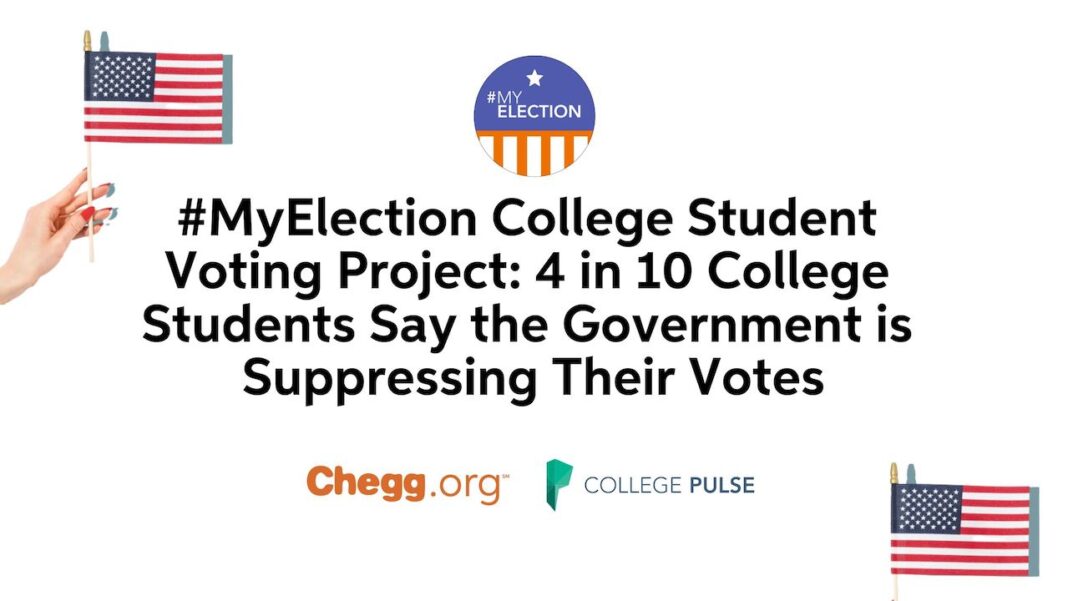
With a week to go until Election Day, college students are largely decided on who they are voting for. But many believe the government is actively trying to suppress the student vote.
A new Chegg.org/College Pulse survey of 1,500 students finds that more than 4 in 10 (42%) students think there is an effort by government officials or politicians to actively suppress the student vote, compared with 32% who do not. Democratic students are four times more likely than Republican students to think the government is actively trying to suppress student votes (60% vs. 15%). Female students (46%) and students of color (48%) are also more likely to believe there are attempts to suppress the student vote.
At the same time, a majority (59%) of students overall think there is a government effort to actively suppress minorities from voting. Democratic students are also more likely than Republican students to believe the government is suppressing the minority vote (80% vs. 15%). Two-thirds (66%) of students of color say the government is suppressing the minority vote, compared to 56% of white students.
6 in 10 Democratic Students Think the Government is Suppressing the Student Vote
Do you think there is an effort by U.S. Government officials/politicians to actively suppress the student vote?
92% of Students Haven’t Changed Their Mind About Who to Vote For
A majority (67%) of students support Joe Biden, and an overwhelming majority haven’t changed their mind about who to vote for this election season. Nine in 10 (92%) students haven’t changed their minds about the two presidential candidates in the last year. Of the 5% who switched from supporting Donald Trump to supporting Biden, the most common reason was the candidate’s personal conduct (42%).
“As someone who ideologically considers themselves a classical liberal and is rather fiscally conservative, I have found myself more closely aligned with the Republican Party,” says Daniel, a senior at American University. “However, I feel like under Trump the Republican Party has aligned itself less and less with the values that attracted me, and I do not feel comfortable supporting Trump’s populism and demagoguery.”
Some students have even ended a friendship over support for a specific candidate. In particular, 5% of students who support Trump say they have ended a relationship with a friend who supported a different candidate, while 31% of Biden supporters have done the same.
30% of Students Have Already Voted
Mail-in voting has gained popularity during this election, allowing millions of Americans to cast their votes early. Like the general population, college students are most likely to say they will be voting by mail (36%). More than 6 in 10 (62%) students who have already voted report using this method. Our survey finds that 30% of students have already cast their ballots, and another 58% plan to do so. Students identifying as strong Democrats are most likely to have already cast their ballots (42%), compared to 27% of students identifying as strong Republicans.
Only 4% of students claim they won’t be voting in this election. For students who aren’t voting, 31% cite feeling as though their vote won’t make a difference to their life. Another 17% don’t think the election will be free and fair.
Students are Hopeful About Their Future, But Not the Country’s
About 6 in 10 (61%) students say they are hopeful about their future, yet only 41% say they are hopeful about the country’s future. However, there are significant differences when comparing students’ candidates of choice. Among students who plan to vote for Trump, 71% are hopeful about the future of the country, compared to just 33% of students who support Biden. Students supporting Trump also feel more hopeful about their own future (88% vs. 55%).
Regardless of students’ political affiliations or hope for the future, a majority plan on voting in the upcoming election. Students want their voices to be heard in 2020.
This research was featured in: Inside Higher Education




